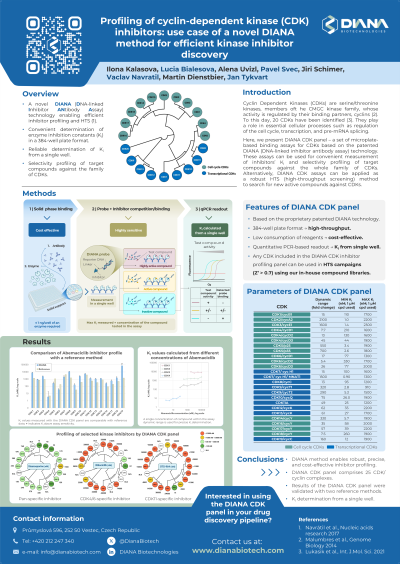Screening Applications & Diagnostics
Poster Session B
(1145-B) Profiling of cyclin-dependent kinase (CDKs) inhibitors: use case of novel DIANA method for efficient kinase inhibitor discovery.
Wednesday, May 29, 2024
10:30 - 11:15 CEST
Location: Exhibit Hall

- IK
Ilona Kalasova, PhD (she/her/hers)
Senior Scientist
DIANA Biotechnologies
Prague, Stredocesky kraj, Czech Republic
Poster Presenter(s)
Abstract: Cyclin- dependent kinases (CDKs) are serine/ threonine kinases, members of CMGC kinase family, whose activity is regulated by their binding partners, cyclins. To this day, 20 CDKs have been identified. They play a role in essential cellular processes such as regulation of the cell cycle, transcription, and pre-mRNA splicing. Deregulation of these processes leads to apoptosis, but if uncorrected it can lead to series of diseases such as neurodegeneration or cancer. For cancer treatment, the goal is to specifically interrupt cell cycle progression to stop tumor growth. For this purpose, CDK inhibitors have been developed.
The early developed CDK inhibitors like flavopiridol and roscovitine, met only a moderate clinical success with partly severe side effects. The use of non-specific CDK pan-inhibitors that addressed several CDKs simultaneously triggered uncontrollable effects which could ultimately cause more harm than benefit to the patients. The focus of further development is therefore on increasing the selectivity of CDK inhibitors.
Here, we present a DIANA CDK panel – a set of microplate-based binding assays for CDKs that utilizes a DIANA (DNA-linked inhibitor antibody assay) technology . These assays can be used for convenient measuring of an inhibitor’s Ki and selectivity profiling of target compounds against a whole family of CDKs. Alternatively, they can also be used as a very robust HTS (high-throughput screening) method to search for new active compounds against any CDK.
The key advantages of DIANA technology are i) cost effectiveness, ii) accuracy, iii) high dynamic range iv) and robustness. Cost effectiveness is achieved by low consumption of target enzyme and by the fact that DIANA technology enables calculation of an inhibitor’s Ki from a single well measurement. However, thanks to its unique set-up it can precisely determine both proper Ki as well as IC50 in the presence of substrates. Moreover, it has a broad dynamic range and can determine accurate affinities of all high-, mid- and low-affinity binders. Finally, combining antibody for kinase capture and small molecule probe for detection in qPCR makes DIANA insensitive to common assay interferences and thus produces robust data.
To showcase the performance of presented technology, we determined the inhibitor profile of several test compounds, which are known inhibitors of either one or more CDKs, against whole CDKs family. Our results suggest that DIANA technology is an attractive and universal kinase screening method combining high robustness and sensitivity. Broader DIANA kinase panel, covering most clinically relevant kinases, is currently under development and is planned to be launched in 2025.
The early developed CDK inhibitors like flavopiridol and roscovitine, met only a moderate clinical success with partly severe side effects. The use of non-specific CDK pan-inhibitors that addressed several CDKs simultaneously triggered uncontrollable effects which could ultimately cause more harm than benefit to the patients. The focus of further development is therefore on increasing the selectivity of CDK inhibitors.
Here, we present a DIANA CDK panel – a set of microplate-based binding assays for CDKs that utilizes a DIANA (DNA-linked inhibitor antibody assay) technology . These assays can be used for convenient measuring of an inhibitor’s Ki and selectivity profiling of target compounds against a whole family of CDKs. Alternatively, they can also be used as a very robust HTS (high-throughput screening) method to search for new active compounds against any CDK.
The key advantages of DIANA technology are i) cost effectiveness, ii) accuracy, iii) high dynamic range iv) and robustness. Cost effectiveness is achieved by low consumption of target enzyme and by the fact that DIANA technology enables calculation of an inhibitor’s Ki from a single well measurement. However, thanks to its unique set-up it can precisely determine both proper Ki as well as IC50 in the presence of substrates. Moreover, it has a broad dynamic range and can determine accurate affinities of all high-, mid- and low-affinity binders. Finally, combining antibody for kinase capture and small molecule probe for detection in qPCR makes DIANA insensitive to common assay interferences and thus produces robust data.
To showcase the performance of presented technology, we determined the inhibitor profile of several test compounds, which are known inhibitors of either one or more CDKs, against whole CDKs family. Our results suggest that DIANA technology is an attractive and universal kinase screening method combining high robustness and sensitivity. Broader DIANA kinase panel, covering most clinically relevant kinases, is currently under development and is planned to be launched in 2025.
